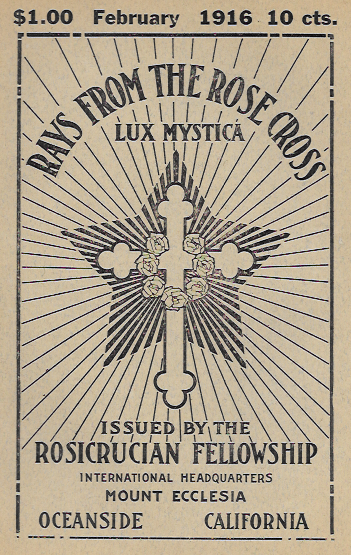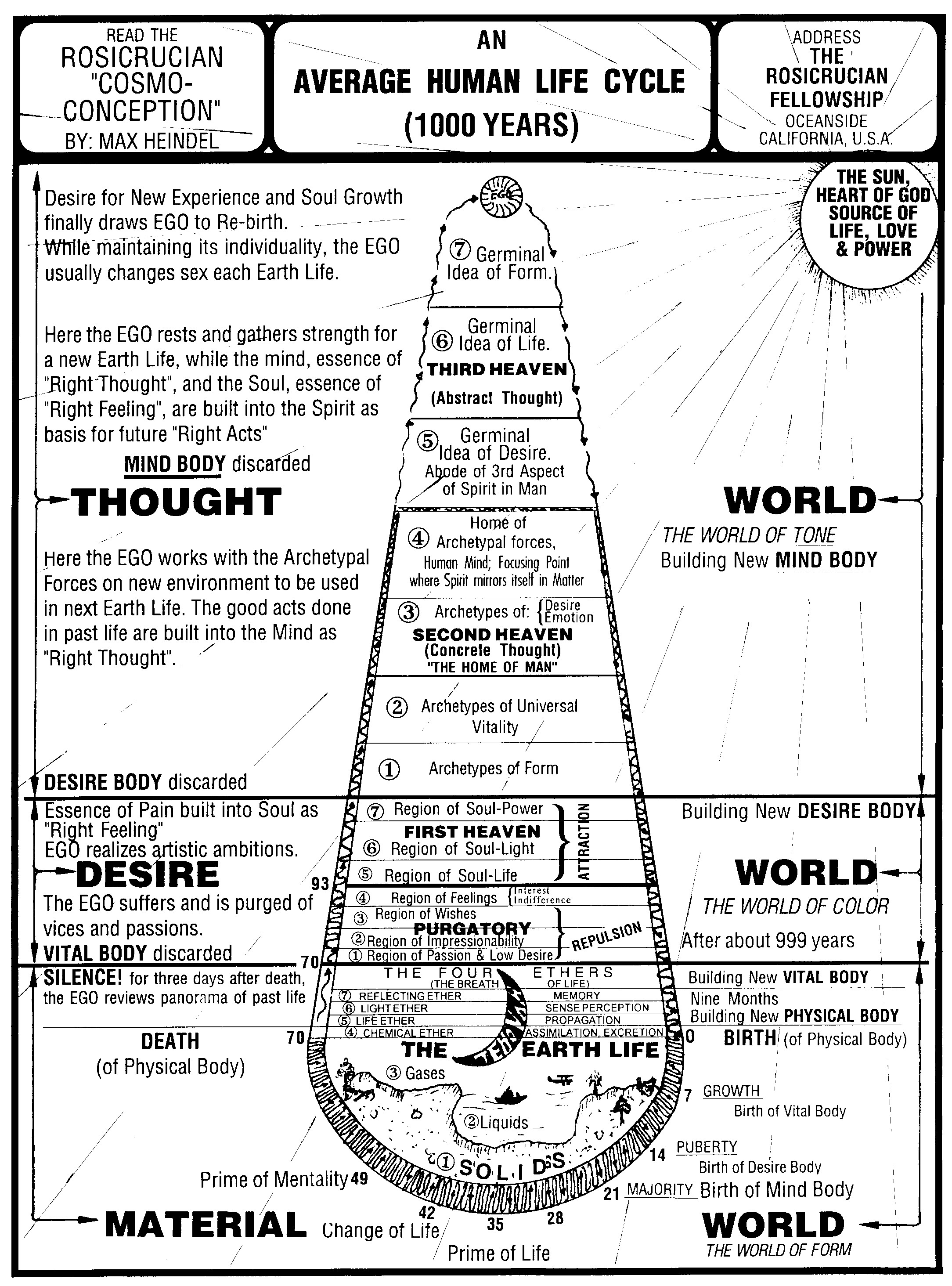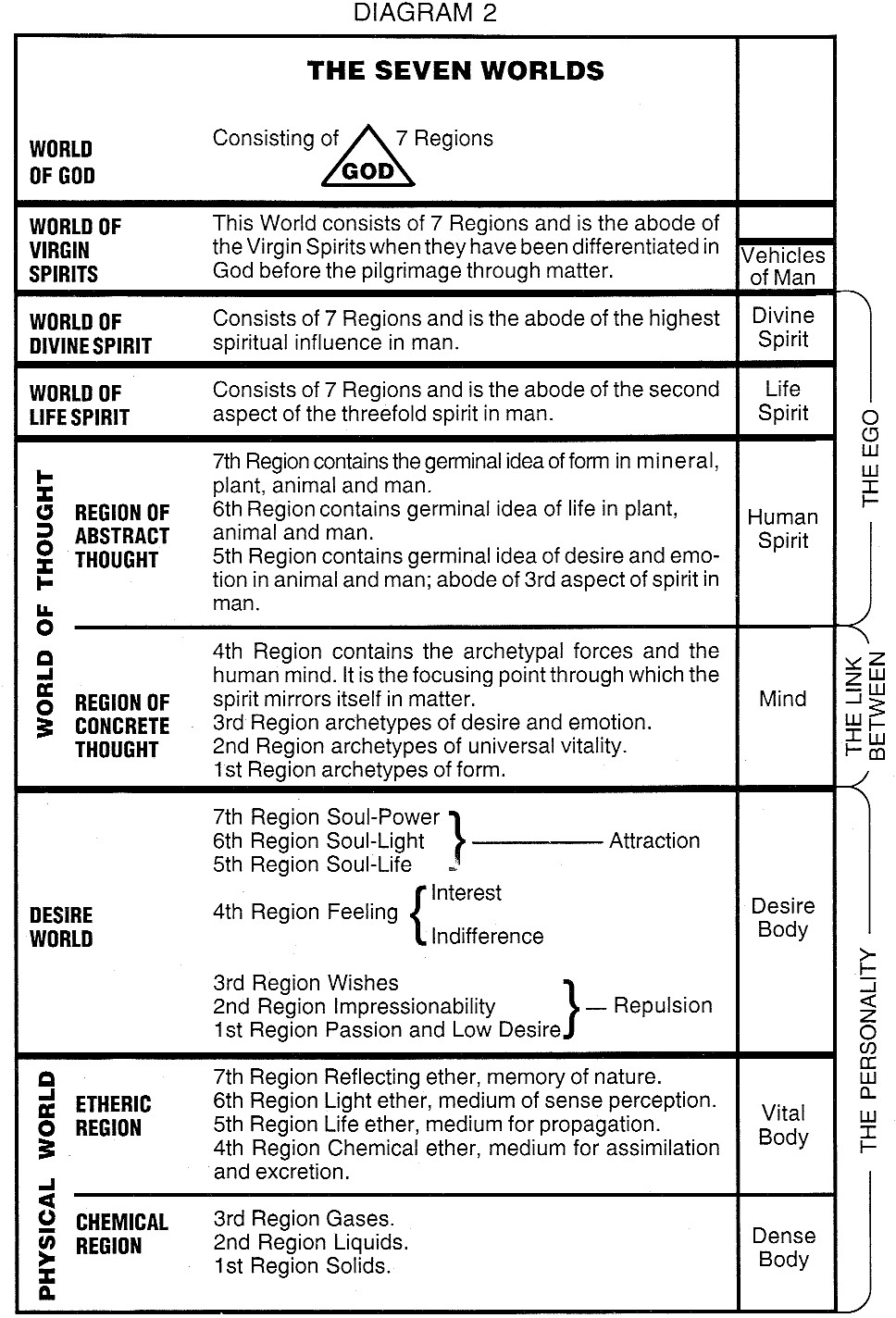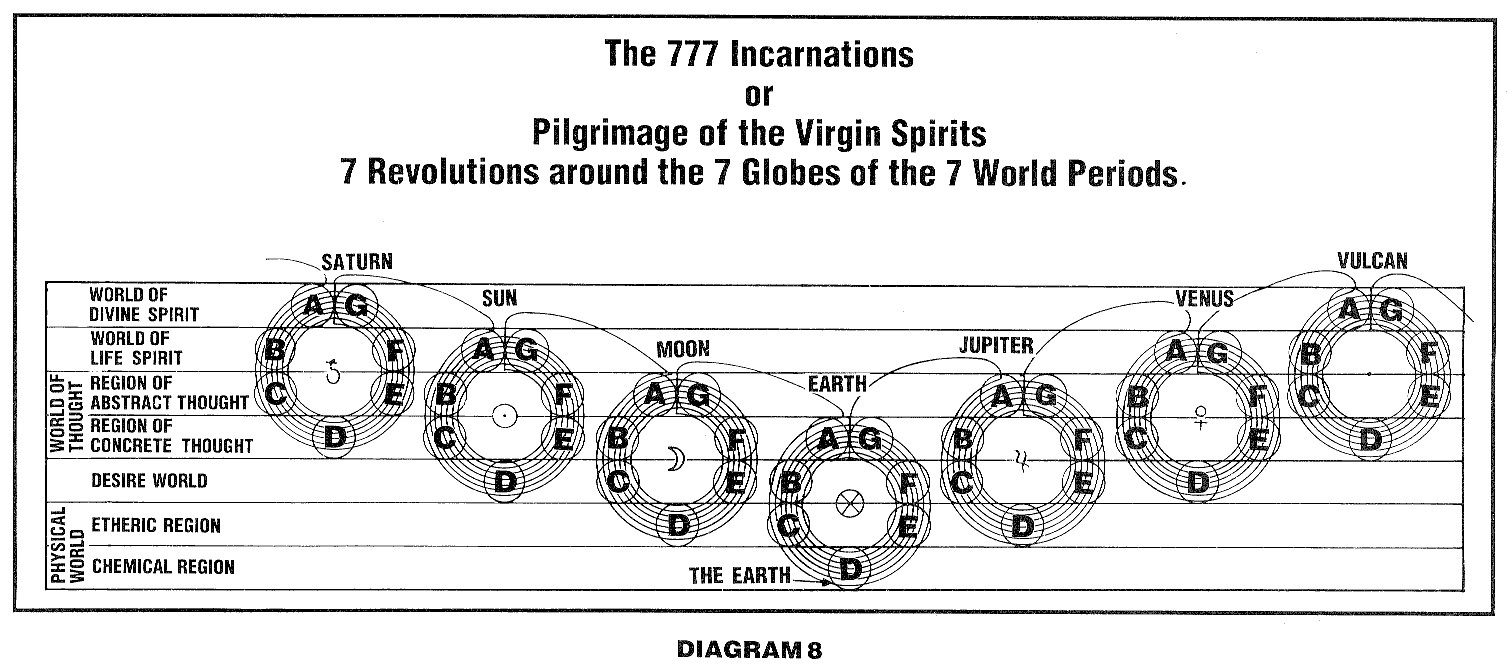
| rosicrucianU.com | ||
| Simplified Scientific Christianity |

Question: Are all children clairvoyant up to a certain age? (Vol. I, #139)
Answer: Yes, all are clairvoyant at least during the first year of their life. It depends upon the spirituality of the child to a great extent, also upon its environment, how long it will keep the faculty, for most children communicate all they see to their elders and the faculty of clairvoyance is affected by their attitude. Often children are ridiculed, and nothing so hurts their sensitive natures. They soon learn to shut out the scenes which engender the ridicule of their elders, or at least they will learn to keep such experiences to themselves. When listened to, they often reveal wonderful things, and at times it is possible to trace a previous life by information from a little child. This happens particularly, of course, if the child died as a child in its previous life, for then it would only have been in the Invisible World from one to twenty years, so that it is possible to verify its information. Children who, in their previous life, died as children, are much more apt to remember the past and to be clairvoyant than other children, because the desire body and vital body are not born at the same time as the physical birth of the child, but at seven and fourteen years of age, respectively, and what has not been quickened cannot die, so that if a child passes out before birth of the vital body or of the desire body, it will not go into the Second and Third Heavens, but will stay in the Desire World and will be reborn with the same desire body and mind that it possessed in its previous life, and therefore it will be very much more apt to remember what happened then. The writer came across such an instance a few years ago in Southern California.
One day in Santa Barbara, a man by the name of Roberts was walking along the street when a little child ran up to him, put her arms around his knees and called him "Papa." Mr. Roberts thought someone was trying to foist a child upon him and indignantly freed himself. The mother of the child was also indignant at its action and took it away. But the child kept crying, "It is my papa, it is my papa." On account of circumstances which will appear later, the incident preyed upon Mr. Roberts' mind, and he went to a gentleman whom we will call "X". Together they sought the house where the little child lived with her parents, and after some parleying were allowed to question her. As soon as the little girl saw Mr. Roberts she ran to him again and called him "Papa." Then, in answer to intermittent questioning during the afternoon, the child told the story, which we give here connectedly.
Once upon a time she lived with Mr. Roberts as her father and another mama in a little house by a brook where flowers grew (here she ran out and fetched some pussy willows.) There was a gang plank across the brook which she was forbidden to cross, lest she fall in the water. One day Mr. Roberts left her mama and herself never to return. After some time her mama laid down and and moved no more. "She became so still, and she died." Then, said the child, "I died too; but I didn't die, I came here!"
Next, Mr. Roberts told his story. "About eighteen years previously he had lived with his father, a brewer, in England. He fell in love with their servant girl, but the father refused permission to marry. The young people ran off to London, were married, went to Australia, where he cleared a little farm in the bush, and built a house by a brook where pussy willows grew. There was a gang plank over the brook. A little child was born to them, and when that child was about two years of age, Mr. Roberts went one day to a clearing about a mile from the cabin and while there an officer of the law approached him with a gun and arrested him for a bank robbery committed on the night he left London.
"He protested his innocence, begged leave to visit wife and child to take care of them, but the officer feared a trap to get him into the hands of confederates, and drove Mr. Roberts to the coast at the point of the gun. He was taken to England, tried for the robbery and found not guilty. Not until then did the authorities listen to his constant ravings about a wife and child who must surely have starved in the wilds of Australia. A telegram was sent, a search party organized and in due time the answer came. They found the skeletons of the deserted ones, and Mr. Roberts departed for America, a heart- broken man."
The child was then shown a number of pictures, in a casual way, among them being two photographs of Mr. Roberts and his wife. Mr. Roberts' appearance had altered very much since that photograph was taken. Nevertheless, when the child came upon the picture, she joyously shouted, "Oh, there is Papa!'' She also recognized the picture of her mother in the previous life. The little child was only about three years of age at the time when Mr. Roberts found her, and could not possibly have made up such a story. Later the case was investigated by one of the foremost newspapers in Southern California, the Los Angeles Times, and the facts found to be as here related.
Question: What is the difference between etheric sight, clairvoyance and the sight pertaining to the World of Thought? (Vol. I, #142)
Answer: When we look at a man with etheric sight, we first see his outside clothing, then the lining inside, his underclothing, his skin, ribs and the various organs of his body along the line of our vision; then the spinal column, the back of the ribs, the flesh, the skin and the clothing on his back. In other words, we see through him. By the etheric sight a man can see through books, papers, letters, walls, or anything else for a short distance. In fact, this faculty may be called X-ray sight. Only one substance is proof against its penetrative faculty. Glass is as opaque to etheric sight as a stone wall to ordinary physical sight for the same reason, perhaps, that glass is such a splendid insulator for electricity.
When we look at a person or a thing with ordinary clairvoyant sight, we see their desire bodies and the counterparts of their other vehicles inside and out—every particle at the same time. It is rather difficult to read a book or even a letter with etheric sight, because we must look through other pages which blur the one we wish to read. When we use ordinary clairvoyance it seems as if the book or letter is spread out so that we can read any page or part without having to look through any other part. But when we look at an object with the sight pertaining to the four lower regions of the World of Thought, and the writer (Max Heindel) has personal knowledge of no higher realms, we find that instead of forms there are hollow spaces or molds, which speak to us and tell us about themselves. The necessity of investigation is eliminated from that world. There we know at once everything about whatever becomes an object of our attention. There is, however, a curious drawback to the knowledge gained in that manner—it dawns upon us all at once. The sum of this knowledge is a whole, and has neither beginning nor end. It is therefore usually a herculean task to unfold it into an orderly, sequential concept which may be comprehensively stated to ourselves and others.
Question: Is it possible to cultivate clairvoyance by the use of drugs, by crystal gazing or breathing exercises, and do these methods not bring results quicker than the methods you advocate? (Vol. I, #148)
Answer: Yes; it is possible to cultivate a certain kind of clairvoyance by any of the methods mentioned, but when a man or woman cultivates the sixth sense by such means he or she is not master of his or her faculty; the power of producing clairvoyance is vested in the crystal and not in the person. He or she is in a similar position to one who learns horsemanship at a riding academy where the horses are trained to allow themselves to be ridden. The pupils acquire no ability to deal with intractable animals, but simply ride by permission of their mount.
If a man learns to break a wild horse he can break others, and rides by virtue of his own power to master his horse, and when a man has used will power instead of drugs or a crystal to subdue his body and cultivate clairvoyance, he has acquired a soul quality which enables him to exercise his faculty in all future lives. But the crystal gazer and the drug abuser have lost their power at death, and must wail until they can obtain drugs or crystals in the new life to train the new body, and thus a great loss of time and effort results from the use of such methods. When we take into consideration the fact that drugs and breathing exercises have a dreadfully destructive effect upon the body, it will be seen that these methods are altogether undesirable. Many a man is today in the insane asylum or in the grave of the consumptive on account of breathing exercises, and the effects of drugs are well known.
Besides, there are various kinds of clairvoyants. There are some who have a faculty of such a nature that the clairvoyant may be likened to a prisoner who sits in his cell behind bars. The window in his cell opens upon a certain view; he cannot escape seeing whatever comes into the range of his vision, for he cannot turn away. There is also a shutter before his window which he cannot control either. Thus at all times when that shutter is open he must see whatever passes outside his window whether the sight pleases him or not. A faculty of that nature is an unmitigated curse, for sometimes the most dreadful scenes are enacted before the vision of such a clairvoyant. The writer (Max Heindel) remembers the case of a certain gentleman, who possessed that kind of faculty. Lecturing before a certain society at the time of the War in the Philippines, a battle scene presented itself before his gaze. An encounter was taking place at that moment between Filipinos and U.S. soldiers. He saw horses ripped open and falling with entrails on the ground, our men being hewn to pieces by the bolos of the natives, etc. Unable to shut off the vision, he turned deathly pale, but exercise of will-power enabled him to finish his lecture without attracting attention from the general audience.
There are other clairvoyants who have only a partial control of their sight and who cannot count on the power at any time. To this class belongs the ordinary medium who prostitutes the faculty for a fee. At times, when the power is on, she may give exceedingly good readings and tell the truth, but at other times, when the power is off, there may be a temptation to secure the fees needed for office rent and personal expenses by simulating. The only safe way to cultivate the faculty of clairvoyance is by means of exercises given by the mystery schools, but these exercises and lessons in the development of the higher faculties are never sold for gold or any material consideration. They are always given without money as a reward of merit. The man who possesses this faculty, cultivated by their method, has no off days, but he will never consent to use it to gratify anyone's curiosity, for tests or other frivolous purpose. He directs all his energy to aid in uplifting humanity.
Question: What time in the morning is best for concentration? (Vol. I, #149)
Answer: The object of the exercises, both morning and evening, is to bring the pupil into conscious touch with the invisible worlds, and there is no time so good as the morning, for during the night the spirit withdraws from the dense body and enters the invisible world, leaving the body asleep upon the bed; and it is the return of the spirit in the morning which causes the body to awake and focuses our consciousness upon the material world through the sense organs. Wordsworth says in his beautiful "Ode to Immortality":
"Our birth is but a sleep and a forgetting: The Soul that rises with us, our life's Star, Hath had elsewhere its setting, and cometh from afar: Not in entire forgetfulness, and not in utter nakedness, But trailing clouds of glory do we come from God, who is our home:
"Heaven lies about us in our infancy! Shades of the prison-house begin to close Upon the growing Boy, But He beholds the light, and whence it flows, He sees it in his joy.
"The Youth, who daily farther from the east, Must travel, still is Nature's Priest, And by the vision splendid Is on his way attended; At length the Man perceives it die away, And fade into the light of common day."
During the life of a person, the Inner Worlds are closest to him in childhood's years, as Wordsworth says, for that is life's morning and so it is with us; when we waken in the morning we are in closer touch with the Spirit Worlds than at any other time of day, and then it is easiest to return to them. Therefore, the pupil should commence his exercises the very moment he wakens, without allowing his mind to rest upon anything else. He should be particular to relax his body perfectly so that no muscle is tense and fix his mind upon a high ideal or upon the first five verses of the Gospel of St. John, either sentence by sentence, or as a whole. That will put him in touch with cosmic vibrations. He should still the senses so that he can hear nothing and see nothing in his room. When he succeeds the scenes of the Desire World will present themselves to his inner vision. First spasmodically, later more and more clearly, as practice makes him perfect.
For most persons, however, the evening exercise is of the greater importance and will probably bring results quicker, because that works upon the life we lead and ennobles us in a way that the morning exercise cannot.
— This article was adapted from "The Rosicrucian Philosophy In Questions and Answers, Vol. I," by Max Heindel.

|

|

|
|
|
Contemporary Mystic Christianity |
|
|
This web page has been edited and/or excerpted from reference material, has been modified from its original version, and is in conformance with the web host's Members Terms & Conditions. This website is offered to the public by students of The Rosicrucian Teachings, and has no official affiliation with any organization. | Mobile Version | |
|